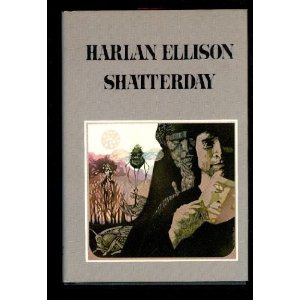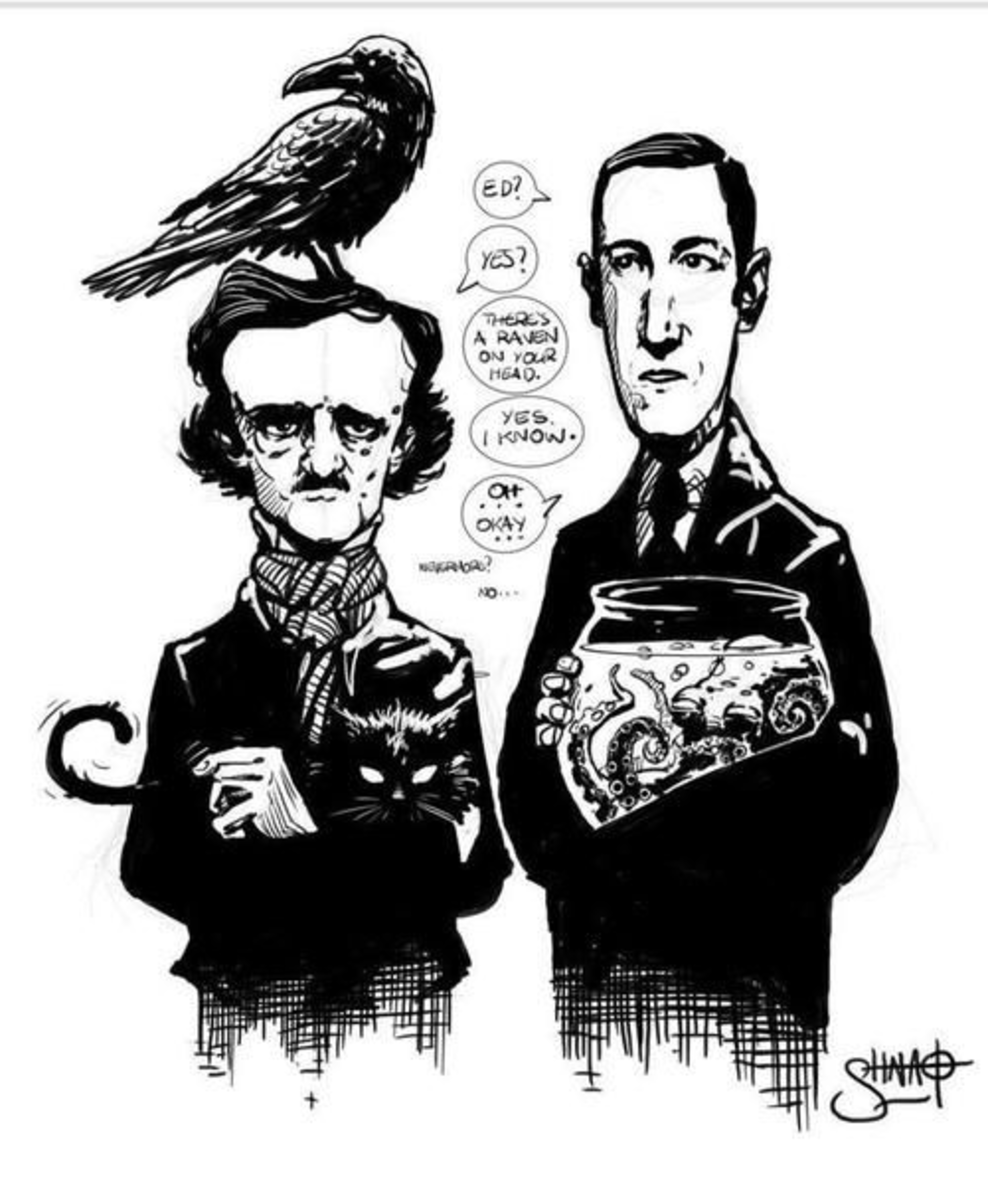- HubPages»
- Books, Literature, and Writing»
- Books & Novels»
- Fiction»
- Science Fiction & Fantasy Books
Harlan Ellison's Shatterday: (An Attempted Book Review)

Note: If you (whoever 'you' might be) do not like long hubs, you'd better pass this one up. You may find it quite laborious for a HubPages book review, I warn you. I should say that it is my custom to treat text in a fairly wide-ranging, relatively comprehensive way. What I mean to say is that this essay may not be the quick, easy, and linear read you're looking for. Okay? Don't say I didn't alert you!
Once agan let me say that this is not a timely book review. But, as always I write this in the hope that some of you, with the inclination, who may have overlooked this book, will give Shatterday by Harlan Ellison a try. As I said, this review is far from timely; the book was published n 1980.
Harlan Ellison (born May 27, 1934) is a writer, whose principal field -- according to Wikipedia -- is speculative fiction. But what does that mean? Is all fiction by definition 'speculative'? I am completely in earnest!
Based on this collection of short stories we're considering here, I would call him a writer of contemporary fantasy.
I say he is 'contemporary' because, based on this collection of stories where looking at here and a few others I've read (though I am not familiar with the full sweep of his work) it seems to me that he sets his stories in the "present" (in this case the world of 1980 when Shatterday was published). He does not go forward or backward in time. Science fiction, almost by definition is futuristic.
I say he is a 'fantasy' writer because the extraordinary effects (and all good fiction should produce extraordinary effects) are not produced by science and technology. In fantasy the extraordinary effects are produced by magic, psychic powers, or what we might call magical realism. In my view, Harlan Ellison's Shatterday falls into the latter category, magical realism.
Now, I say this is "what we might call magical realism" because the word (like many words) may mean something different to different people. For me, magical realism is: the idea, conveyed through written fiction, certain television shows, and movies (and in earlier decades something called radio teleplays), that reality is, itself, inherently 'magical.' That is to say that we are given the impression that the uncanny effects we witness are a normal, if rarely seen, feature of the universe.
In other words, in this type of fiction, we are given to understand that the uncanny forces the characters encounter are a normal feature of the universe, and are, as such, ever-present in the universe; but we can encounter these forces only accidentally or if we "know where to look" (for the 'magic,' as it were). No suggestion is ever made that there is a break in the continuity of "life as we know it."
There is no wizard doing it (whatever wizards do)....
There is no angel or demon doing it.....
There is no person from the future, another planet, time, or dimension doing it (again, whatever such persons do)....
Let's begin
Shatterday is a collection of sixteen short stories written by Harlan Ellison, in the magical realism tradition, as I have defined it.
Okay. Where to begin? Where to begin?
Well, I think we might start with the blurb that appears on the outer backside cover. These words are attributed to the writer of The Shining and The Dead Zone, Stephen King.
"If there is such a thing as a fantasist for the 1980s (always assuming there are 1980s) then Harlan Ellison is almost surely that writer."
The 1980s
Yes, this is a good place to start, but there's a problem. Shatterday was published, as a collection, in 1980, the very start of the decade. Most of the stories seem to have been previously published in the mid to late 1970s, with one published in 1967.
So what could Mr. King have meant by "(always assuming there are 1980s) then Harlan Ellison is almost surely that writer"? To start with there seems to be a question as to whether or not each decade has its own particular character or "spirit of the age." In nominating Harlan Ellison as the fantasist whose work would be most emblematic of the decade of the 1980s, that was just beginning, Stephen King was also making a guess about what the character or "spirit of the age" of the 1980s would be.
We cannot know what Mr. King had been thinking at the time, but I presume that he made his assessment about what the 1980s would bring based on what had come before, namely, the 1970s.
I do believe the 1980s had a particular character and that the decade was, in many ways, a product of the 1960s and 1970s.
So, what were the 1980s? And does the work of Harlan Ellison, especially as presented here in Shatterday (and to what extent) foreshadow the spirit of the 1980s? First of all, to be fair to Mr. Ellison, we must acknowledge the old truism of history that we can 'see' the 1980s much more clearly in retrospect than anyone could at the start of the decade, and more clearly than any of us could while we were living through them. Still, we do expect a bit of prophesy from our writers and poets, don't we?
I'd like to start by quickly saying that the social justice struggles (anti-Vietnam war, black rights, women's liberation, gay liberation, the "freedom of information act"[1966], and so forth) have, in many ways, made the United States a much freer, more tolerant, and more civilized society. This was part of the legacy bequeathed to the 1980s. But it was the 1980s that launched a new or revived political-economic orientation known as 'neoliberalism,' or the 'Washington Consensus,' or 'Economic Rationalism.' This decade began the state's repudiation of the New Deal; the state openly and unapologetically, once again, sided with capital against labor in many ways. The 1980s were the beginning of what is known as the deindustrialization and financialization of the economy; the state made the strategic decision to nurture and support finance capital over manufacturing capital. The result of all of this was mass layoffs, the offshoring of production, and the cutting and attempted elimination of social programs.
The 1980s, therefore, were a decade of what I would call societal cognitive dissonance. To oversimplify, what I mean by that is to say that something "good" always seemed to be contradicted or offset by something "bad." To give a quick example, think of the women's liberation movement of the 1970s and early 1980s. This was/is a good thing to be sure. Women were fighting for equal opportunity in every realm of our society (politically, legally, economically, educationally, and so forth); and were slowly gaining ground. Though we are not quite "there" yet, women were winning more equal opportunities in the still-male-dominated workplace.
The thing is, though, the structural changes of the economy which occurred in the mid-1970s made it NECESSARY that women go into the workplace! We were leaving behind those days when one full-time salary could support the expenses of an entire household. *Even women going into the workplace wasn't enough (women getting jobs had their own offsets); families had to increasingly and disastrously rely on the credit card. This is an example of what I mean by societal cognitive dissonance.
The 1980s also, in some senses, plunged America into an age of alienation. What do I mean by 'alienation'? I mean that one suddenly feels 'alien' in relation to institutions, structures, communities, customs, a way of life that had once seemed so familiar and reassuring; and that works in reverse as well, in that institutions, structures, communities, customs, and a way of life that had once seemed so familiar and reassuring, themselves come to feel 'alien.' This is another way of saying that the "American Dream" seems to be more and more out of reach.
Alienation. During the 1980s government just seemed to lose all interest in helping ordinary people. It seemed that whenever working class and poor people asked for services, all of the sudden immense bureaucratic barriers sprang up and people found themselves wading through oceans of discouraging "red tape;" but when business (especially big business) wanted services and considerations from the state, it seemed that all bureaucratic barriers that had previously been in place vanished as if they had never been there.
Alienation. The 1980s were the decade when working Americans were to learn what it was like to have a precarious existence. For example it was President Ronald Reagan who fired over eleven thousand air traffic controllers when they had gone on strike. Such a draconian approach to labor relations had been unheard of for several decades!
Alienation. Don't quote me but I believe it was during the decade of the 1980s when American participation in groups and clubs started to fall off precipitously, as more and more energy was required simply to hold day-to-day life together.
Alienation. The American worker, more than any worker in the industrialized world, is alienated from time itself. The American worker is a "slave" to time in a way that is unknown in Western Europe, and even Japan. You have to scarf down that sausage biscuit and slurp coffee all over yourself as your driving to your second or third job. In the year 1980 the wages of American workers were the highest in the industrialized world and working hours were the lowest. By the end of the decade the situation was exactly the reverse. Now, as we all know, American workers put in by far the longest hours, for the least pay and benefits, for the least amount of vacation time by far, and even, I think, the least respect by far than any other workers in the entire industrialized world. That old adage "time is money," I suspect, remains to this day, a uniquely American sentiment.
And speaking of time....
The story "Jeffty Is Five" is, like all of Mr. Ellison's stories in this collection, expertly executed. This is a horror story, like a silent, ten-minute scream. Jeffty is a person who is five years old, and through the agency of a special (or accursed) radio, remains biologically, physiologically and anatomically, as well as emotionally five years old -- year after year, decade after decade.
You may recall that those who came of age in the 1980s were referred to as the "ME generation," meaning selfish, materialistic, juvenile, avaricious, and individualistic (and again, I would maintain that it was the corporate-government nexus that actually encouraged this turn in the national character as it morphed into its "neoliberal" incarnation). Its also interesting to note that those social justice activists who had been radical in the 1960s and 1970s, for the most part, basically de-mobilized, as it were, in the 1980s. They cut their hair, bought minivans, and became "yuppies."
These two converging streams of consciousness produced the civilization which Robert Bly would call The Sibling Society, the title of his 1997 book, about an American culture that is perpetually stuck in juvenile, avaricious, celebrity-obsessed, narrow, materialistic pursuits and interests -- there's something immature about America, in other words (Bly's thesis). Okay.
Count The Clock That Tells The Time
Mr. Ellison probably wouldn't agree with me, or assess this story the way I do. But to my way of thinking, this tale, in microcosm, perfectly illustrates the alienation of the American worker from time itself, in the way I've discussed earlier. The 1980s were the decade that acclimated the American worker to working longer hours, harder, for less compensation. Real wages have not moved (even declined a little) since 1978. In Western Europe, of course, the situation is much different. The European worker enjoyed steady increases in real wages all that time, and a steady REDUCTION of working hours.
Again, the notion "there's not enough hours in the day," I would imagine is another uniquely American conception. ALIENATION FROM TIME ITSELF!!
The story is about a lonely young man who works at an industrial design firm. He is single and one day gets to thinking that "life is passing [him] by," and all that. Soon after he wonders "where does the time go?" he is thrust into a Twilight Zone-like adventure in which he learns precisey where time indeed goes to. There is a young woman. Those two fall in love. For a while it seems like this romance is going to be a "ships passing in the night" affair, but no, they end up together, and one is happy for them.
In The Fourth Year Of The War
Don't worry, I'm not going to review each and every story. We are just concerned with a few major themes. It seems to me that during the late 1970s and perhaps early 1980s, America had a bit of a fascination with serial killers, yes?
The protagonist, here, is a serial killer, driven to extremes by what we might call "alienation," mostly derived from his own family. The interesting thing about this story is: either it is a genre story, and therefore the protagonist is indeed being "haunted," if you will, by an alien, invasive spectre, which takes the form of a "voice in [his] head," urging him to take lethal revenge on those who have hurt him; or it is not a genre story, and what is presented to us, the readers, as a haunting of this young man by an alien, invasive spectre, which takes the form of of a "voice in [his] head," urging him to take lethal revenge on those who have hurt him ---- is just the routine psychological delusion of the criminally insane. What I think of as magical realism sometimes has this ambiguous, ambivalent property.
The Man Who Was Heavily Into Revenge
There is some social theory which suggests that in a society in which the perception of injustice or the lack of justice broadens and deepens, more and more people will be prone to "taking matters into [their] own hands," taking direct revenge when wronged by another, resorting to violence, even murder.
What we started to get in the 1980s was a country (the United States) and a world in which, paradoxically, a RISE in personal freedom actually accompanied a DECLINE in social justice. Not only that, it seemed as though the RISE in personal freedom (a particular kind of freedom in this case, the freedom of capital), by definition brought about the DECLINE in social justice. One of the easiest examples I can think of is the NAFTA trade agreement enacted during the Clinton administration. You can ask me about NAFTA in the comments if you like.
Just as an aside, let me mention that its interesting to note that it was between 1974 and 1994 we got all of those Charles Bronson "Death Wish" movies. Remember?
In 1979 the movie The Warriors (starring Michael Beck) came out. The Warriors was about a street gang, in New York City, running for their lives from literally every other gang of New York City. Subtext: If the thugs are even running scared then we had all better double-bolt our doors and put bars on our windows. The suggestion was that the state was stepping away from its traditional role of protecting the citizenry (in favor of protecting capital).
Anyhoo.... the actual story by Harlan Ellison, "The Man Who Was Heavily Into Revenge" is a tale in which the characters have clearly fallen into "The Twilight Zone," as it were, where one has the ability to unconsciously direct the universal forces of "karma," I suppose, in such a way that brings about the complete and utter hindrance and frustration of the person who has wronged you in some way. And on and on it goes, potentially. Its like a karmic chain-letter.
All The Lies That Are My Life
This is perhaps Mr. Ellison's best story in the collection. It is not even a genre story at all, in that its extraordinary effects are not produced by science, technology, fantasy, or magical realism; and it is not a mystery or crime story. This is a "literary" story, in that there is no clear-cut, straightforward problem to be solved, as there is in typical genre fiction of one kind or another.
"All The Lies That Are My Life" is long, a thirty-three thousand word novella. All I want to say about this tale, here, is that it is a story about writing. As someone who likes to write, I always enjoy stories about writing. Of course, there are many amusing and intriguing diversions in this novella, but at its heart, from start to finish, "All The Lies That Are My Life" is a story about writing.
I believe that all writers must, at some point, reflect upon the art or craft of writing!
Okay, let's leave it there. Thank you for reading, all of those who made it this far.
Why don't we get out of here with a little song, why don't we? Say, do you remember this one?
Ta-Ta!







